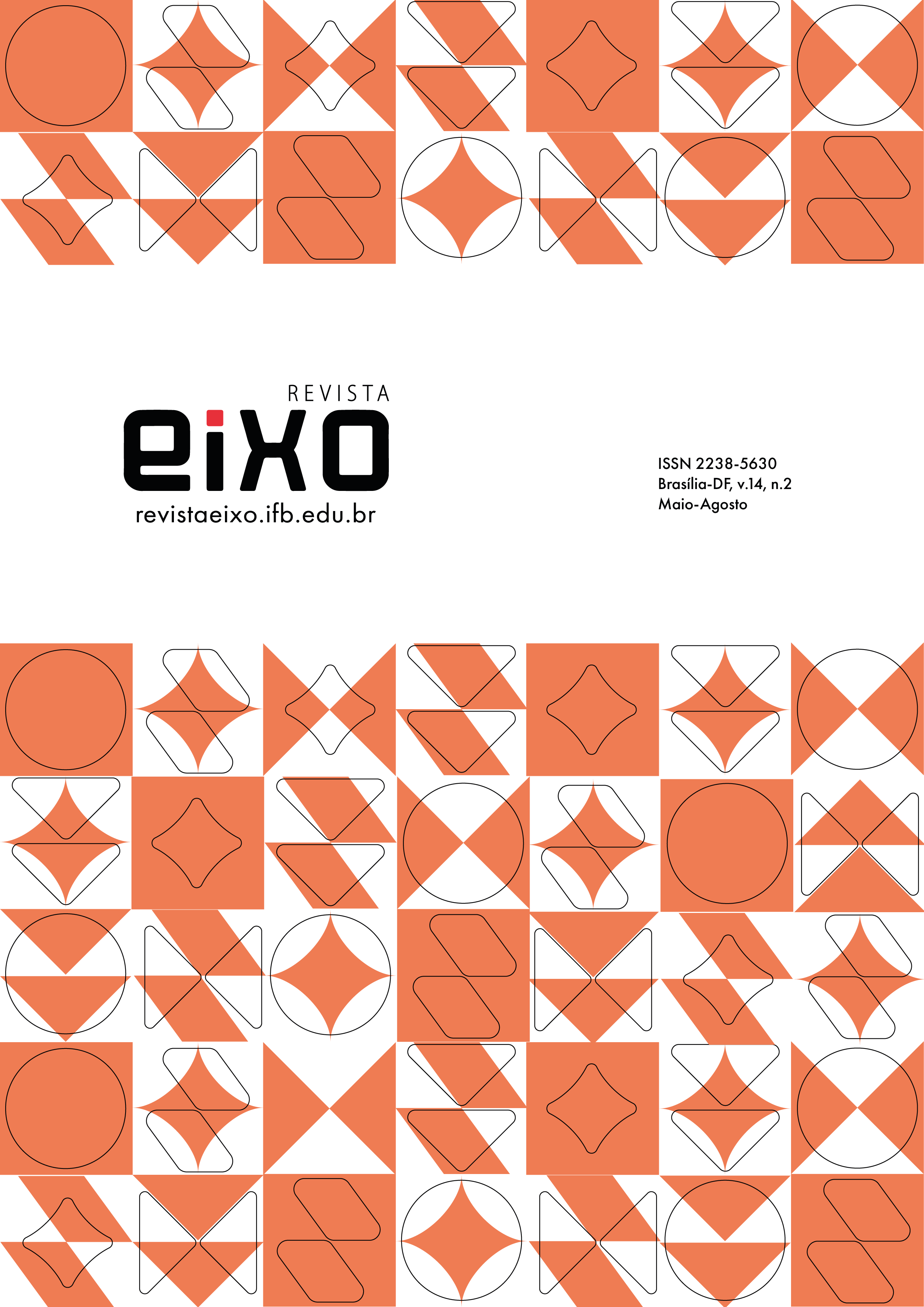Students' Perceptions of Integrated High School at IF Baiano: Contributions to the Integral Development.
contribuições para o desenvolvimento integral
DOI:
https://doi.org/10.19123/REixo.v14n2.13Abstract
This study sought to understand and analyze how students from the Technical Course in Agriculture Integrated with High School at IF Baiano, Campus Guanambi, perceive the integration between academic/scientific education and professional training. To achieve this, interviews were conducted with 20 third-year students from the course, in addition to a review of institutional documents. The data were analyzed using content analysis, which revealed students' difficulties in connecting theory with practice, as well as confusion in distinguishing between the labor market and the world of work. This fragmentation between basic high school education and technical training ends up isolating areas of knowledge, limiting the integrated education that the course proposal aims to achieve. In the final considerations, the study highlights that IF Baiano plays a transformative role in the lives of its students; however, to fully realize this potential, investment is needed in greater curricular integration and in pedagogical practices that continuously bridge theory and practice. With these changes, integrated vocational education at the high school level can become even more meaningful, better preparing students for the challenges of the contemporary world.
References
Referências
BARDIN, Laurence. Análise de Conteúdo. 70.ed. São Paulo: Livraria Martins Fon-tes, 2011.
BRASIL. Ministério da Educação. Educação Profissional Técnica de Nível Médio Integrada ao Ensino Médio. Documento Base. Brasília: MEC, 2007. Disponível em: https://portal.mec.gov.br/setec/arquivos/pdf/documento_base.pdf. Acesso em: set. de 2024.
CIAVATTA, M. O Ensino Integrado, a politecnia e a educação omnilateral. Por que lutamos? Trabalho & Educação, Belo Horizonte, v.23, n.1, p.187-205, jan.-abr, 2014.
CIAVATTA, M.; RAMOS, M. N. A formação integrada: desafios à educação básica e profissional. Educação em Revista, Belo Horizonte, v. 27, n. 3, p. 299-326, 2012b
CIAVATTA, M.; RAMOS, M. N. Formação integrada: para além da escola de trabalhadores. Educação em Questão, Natal, v. 42, n. 29, p. 295-322, 2012a.
CIAVATTA, Maria; RAMOS, Marise. Ensino Médio e Educação Profissional no Brasil: dualidade e fragmentação. Revista Retratos da Escola, Brasília, v. 5, n. 8, p. 27-41, jan./jun. 2011.
FONTANELLA, B. J. B.; RICAS, J.; TURATO, E. R. Amostragem por saturação em pesquisas qualitativas em saúde: contribuições teóricas. Cad. Saúde Pública, v. 24, n. 1, p. 17-27, 2008.
FRIGOTTO, G.; CIAVATTA, M.; RAMOS, M. (orgs). Ensino Médio Integrado: concepções e contradições. São Paulo: Cortez, 2005.
GIL, A. C. Como elaborar projetos de pesquisa. 5. ed. São Paulo: Atlas, 2010.
INSTITUTO FEDERAL DE EDUCAÇÃO, CIÊNCIA E TECNOLOGIA BAIANO – Campus Guanambi. Projeto Pedagógico do Curso Técnico em Agropecuária Integrado ao Ensino Médio. Guanambi: IF Baiano, 2019
INSTITUTO FEDERAL DE EDUCAÇÃO, CIÊNCIA E TECNOLOGIA BAIANO — IFBAIANO. Plano de Desenvolvimento Institucional. Salvador, 2021-2024. Disponível em: http://www.ifbaiano.edu.br/reitoria/wp-content/uploads/2015/06/pdi-diagramado.pdf. Acesso em: 16 set. 2024
MINAYO, M C. de S. (org). Pesquisa Social: teoria, método e criatividade. 21. ed. Petrópolis: Vozes, 2002
MINAYO, M.C.S. O desafio do conhecimento: pesquisa qualitativa em saúde. São Paulo/Rio de Janeiro: Hucitec/Abrasco, 2001.
MOURA, D. H., LIMA FILHO, D. L., SILVA, M. R. Politecnia e formação integrada: confrontos conceituais, projetos políticos e contradições históricas da educação brasileira. Revista brasileira de educação, v. 20 n. 63, p. 1057-1080, out-dez. 2015.
NOGUEIRA, Maria Alice. Educação, saber, produção em Marx e Engels. 2 ed. São Paulo: Cortez, 1993.
RIBEIRO, E. C. S. R.; SOBRAL, K. M.; JATAÍ, R. P. Omnilateralidade, politecnia, escola unitária e educação tecnológica: uma análise marxista. In: Jornada Internacional De Estudos E Pesquisas Em Antonio Gramsci, 1., 2016, Ceará. Anais [...]. Ceará: UFC, 2016. p. 1-11
SANTOS, M. G. C. A categoria de formação omnilateral em Marx e o trabalho enquanto princípio educativo. In: Seminário Internacional, I e Fórum de educação do campo da região sul do RS: campo e cidade em busca de caminhos comuns, 1. 2012, Pelotas. Anais [...]. Pelotas: UFPel, 2012. p. 1-13.
SAVIANI, D. O choque teórico da Politecnia. Trabalho, Educação e Saúde, v. 1, n. 1, p. 131-152, 2003.
SAVIANI, Dermeval. Trabalho e educação: fundamentos ontológicos e históricos. Rev. Bras. Educ. [online]. 2007, vol.12, n.34, pp.152-165. Disponível em: http://educa.fcc.org.br/scielo.php?script=sci_abstract&pid=S1413-24782007000100012&lng=pt&nrm=iso Acesso em: set. de 2024.
VIEIRA, M.; VIEIRA, A.; PASQUALLI, F. Educação profissional: além das demandas do mercado de trabalho. São Paulo: Editora Educacional, 2023.
Downloads
Published
How to Cite
License
Copyright (c) 2025 Mayana Abreu Pereira, Ricardo dos Santos Silva (Autor)

This work is licensed under a Creative Commons Attribution-NonCommercial-ShareAlike 4.0 International License.
Nos seguintes termos:
- Atribuição - Você deve dar o crédito apropriado , fornecer um link para a licença e indicar se as alterações foram feitas . Você pode fazê-lo de qualquer maneira razoável, mas não de qualquer forma que sugira que o licenciante endossa você ou seu uso.
- Não Comercial - Você não pode usar o material para fins comerciais .
- ShareAlike - Se você remixar, transformar ou construir sobre o material, você deve distribuir suas contribuições sob a mesma licença que o original.
- Sem restrições adicionais - Você não pode aplicar termos legais ou medidas tecnológicas que restrinjam legalmente outros de fazer qualquer coisa que a licença permita.













